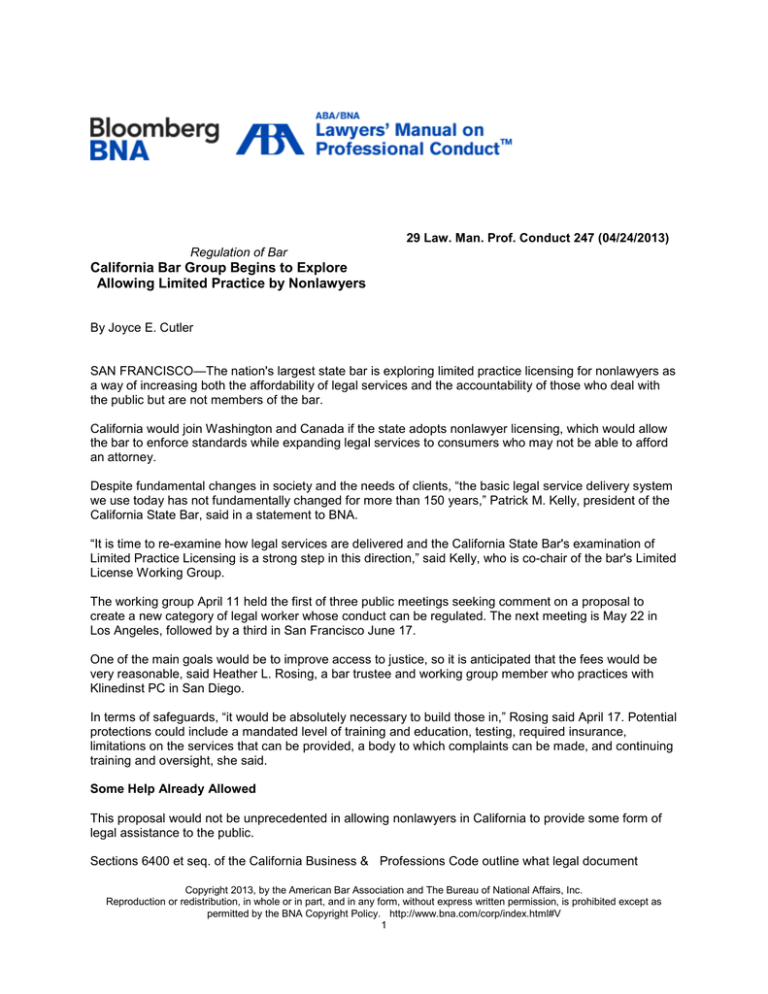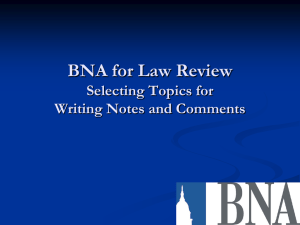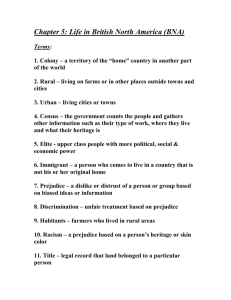California Bar Group Begins to Explore Allowing Limited Practice by
advertisement

29 Law. Man. Prof. Conduct 247 (04/24/2013) Regulation of Bar California Bar Group Begins to Explore Allowing Limited Practice by Nonlawyers By Joyce E. Cutler SAN FRANCISCO—The nation's largest state bar is exploring limited practice licensing for nonlawyers as a way of increasing both the affordability of legal services and the accountability of those who deal with the public but are not members of the bar. California would join Washington and Canada if the state adopts nonlawyer licensing, which would allow the bar to enforce standards while expanding legal services to consumers who may not be able to afford an attorney. Despite fundamental changes in society and the needs of clients, “the basic legal service delivery system we use today has not fundamentally changed for more than 150 years,” Patrick M. Kelly, president of the California State Bar, said in a statement to BNA. “It is time to re-examine how legal services are delivered and the California State Bar's examination of Limited Practice Licensing is a strong step in this direction,” said Kelly, who is co-chair of the bar's Limited License Working Group. The working group April 11 held the first of three public meetings seeking comment on a proposal to create a new category of legal worker whose conduct can be regulated. The next meeting is May 22 in Los Angeles, followed by a third in San Francisco June 17. One of the main goals would be to improve access to justice, so it is anticipated that the fees would be very reasonable, said Heather L. Rosing, a bar trustee and working group member who practices with Klinedinst PC in San Diego. In terms of safeguards, “it would be absolutely necessary to build those in,” Rosing said April 17. Potential protections could include a mandated level of training and education, testing, required insurance, limitations on the services that can be provided, a body to which complaints can be made, and continuing training and oversight, she said. Some Help Already Allowed This proposal would not be unprecedented in allowing nonlawyers in California to provide some form of legal assistance to the public. Sections 6400 et seq. of the California Business & Professions Code outline what legal document Copyright 2013, by the American Bar Association and The Bureau of National Affairs, Inc. Reproduction or redistribution, in whole or in part, and in any form, without express written permission, is prohibited except as permitted by the BNA Copyright Policy. http://www.bna.com/corp/index.html#V 1 assistants and unlawful detainer assistants can do to help individuals complete forms. Section 6450 defines paralegals' tasks and prohibitions. “All three are outside the purview of the California State Bar,” Rosing said. Paralegals currently do not need to be licensed in California, although the statutory scheme sets forth certain criteria to serve in that role, Rosing said in an email to BNA. “And, most importantly, all paralegals must strictly work under the supervision of an attorney,” she stated. “The limited licensing program in Washington, on the other hand, does not require attorney supervision. The point is to allow non-licensed individuals to independently provide limited legal services, to increase access to justice at a time when the need is critical,” Rosing said. Immigration consultants under Sections 22440 et seq. likewise can help with nonlegal tasks including filing forms. Concerns The question of the California legal community's response to any limited licensing proposal “is an important one,” Rosing said. “The goal would not be to take away work from licensed practitioners, but rather to provide a resource to those individuals who cannot afford a lawyer, and therefore would be pro se,” she said. While some resistance from lawyers is possible, Rosing said, “it is also expected that there will be support as well.” Mark Ressa, a San Ramon, Cal., family law attorney and chair of the state bar's Family Law Executive Committee, said a prime motivator seems to be protecting consumers from people who hold themselves out to assist in legal matters. “And the issue is there are people who are out there who are doing this all the time anyway. They are dispensing advice, they are not doing it under the supervision of a licensed attorney,” Ressa told BNA. “I think they [bar trustees] are trying to get control of it and that itself cannot be a bad thing.” Scope and Resources When licensed attorneys “give advice beyond the scope of our expertise and our advice is wrong, the state bar can act appropriately in this situation,” Ressa said. For those it does not regulate, the state bar sends a cease-and-desist letter to already overstretched district attorneys, he said April 22. It is difficult even for family law attorneys to properly comply with all of the forms and the complexity of the issues, “and the grave concern is just filling out forms is not enough. You have to plan for the future” and the unexpected or even unknown, he said. An issue for some lawyers is that a large percentage of bar dues already goes toward discipline, Ressa said. “There is a concern if we add this additional burden on the state bar for persons not only licensed as attorneys but these individuals who are licensed through this limited licensing situation, then it's really going to tax the state bar,” he said. Looking North One the reasons the Board of Trustees created the working group was to examine how Washington was approaching the issue, said bar Executive Director Joseph Dunn. Copyright 2013, by the American Bar Association and The Bureau of National Affairs, Inc. Reproduction or redistribution, in whole or in part, and in any form, without express written permission, is prohibited except as permitted by the BNA Copyright Policy. http://www.bna.com/corp/index.html#V 2 In June 2012 a divided Washington Supreme Court adopted a rule creating a new breed of nonlawyer technicians who are permitted to assist the public with noncomplex legal problems and complete forms without a lawyer's supervision. See 28 Law. Man. Prof. Conduct 416. The Washington State Bar Association's Limited License Legal Technician Board in March approved family law as the first practice area for technicians. The scope of practice is limited to issues pertaining to dissolution of marriage; legal separation; parenting and support; parentage; intimate domestic relationships; and domestic violence actions. Washington licensed technicians will not, however, be permitted to represent clients in court or negotiate with opposing parties. Applicants must have a minimum of an associate-level degree and pass a qualifying examination. Elsewhere, New York Court of Appeals Chief Judge Jonathan Lippman, in his state of the judiciary speech, announced Feb. 3 that he was appointing a committee to develop a pilot program for limited licensing of nonlawyers in that state. Medical Analogy The California bar also is looking to the experience of the state's Medical Board as one example of how services by nonlawyers may be integrated with those of licensed professionals. Dunn said April 18 the bar “looked at physician assistants quite deliberately” as an analogy. Section 2544 of the Business & Professions Code limits physician assistants' duties. Physician assistants are not licensed, certified, or registered by the state, although the assistant's employer and/or the supervising doctor's malpractice insurance carrier may require that the medical assistant be certified by a national or private association, according to the Medical Board. While the limited license proposal is not currently synched to the bar's practical skills task force that is considering requirements for new lawyers, “they might end up being related,” Dunn said. A state bar task force in February recommended that newly admitted California lawyers be required to complete 250 hours of practical skills training, perform 50 hours of voluntary legal service, and take 10 additional hours of continuing legal education as a condition of licensure. See 29 Law. Man. Prof. Conduct 134. For More Information The information page of the Limited License Working Group is available at http://www.calbar.ca.gov/AboutUs/BoardofTrustees/LimitedLicenseWorkingGroup.aspx. The ABA/BNA Lawyers’ Manual on Professional Conduct, a joint publication of the American Bar Association Center for Professional Responsibility and Bloomberg BNA, is available (in print or Web version) by subscription through the ABA Web Store or by contacting BNA at 1-800-372-1033 or customercare@BNA.com. For a free trial subscription go to www.bna.com/products/lit/mopc.htm. Copyright 2013, by the American Bar Association and The Bureau of National Affairs, Inc. Reproduction or redistribution, in whole or in part, and in any form, without express written permission, is prohibited except as permitted by the BNA Copyright Policy. http://www.bna.com/corp/index.html#V 3


